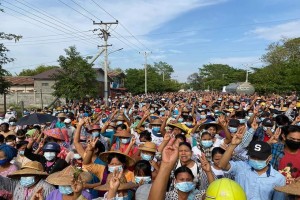
Photo source: maung zarni @drzarni|Twitter
Geneva: As powerful actors in the current fragile and deteriorating context in Myanmar, businesses must uphold their human rights responsibilities and put pressure on the military junta to halt grave human rights violations, UN experts from the UN Working Group on human rights and transnational corporations and other business enterprises (known as the Working Group on Business and Human Rights), said today.
As the military junta is intensifying its campaign of repression against its own people in Myanmar, the experts urged companies to act in line with the Guiding Principles on Business and Human Rights to avoid contributing to human rights violations, or becoming complicit in crimes if they continue to operate in Myanmar.“Because the risk of gross human rights violations has greatly increased in Myanmar, action by States and human rights due diligence by business, and investors, should be rapidly and proportionately heightened,” said Surya Deva, Vice-Chair of the Working Group on Business and Human Rights.
“Businesses, both individually and collectively, should exert the maximum leverage on the military in Myanmar to halt what the High Commissioner for Human Rights has said may amount to crimes against humanity,” added the UN Special Rapporteur on the situation of human rights in Myanmar, Tom Andrews.
The coup of February 1, 2021 has placed businesses with operations or business relations in Myanmar in a challenging situation. While some businesses have reiterated their public support for the rule of law and human rights, and cut ties with the junta, many continue to engage in business with the military as if nothing has happened, they said.
Information suggests that the military’s economic interests, including access to arms and technology, remain largely untouched and unchallenged by other States, and businesses operating in the country.
“The revenues that the military earns from domestic and foreign businesses substantially enhances its ability and capacity to carry out these grave violations,” Andrews said.
The UN experts noted that measures taken by businesses, such as suspension of payments and financial flows that may aid the perpetration of widespread and systematic human rights violations, should target the military and have the minimum possible negative impact on the rights of employees and the general population.
In 2019, the Independent International Fact Finding Mission on Myanmar concluded that no business should enter into an economic or financial relationship with the security forces of Myanmar, in particular the military, or any enterprise owned or controlled by them or their individual members, until and unless they are restructured and transformed.
The experts also endorsed the Human Rights Council’s call for home States of businesses investing in, or with supply chains in Myanmar to take appropriate measures so that those businesses actively conduct heightened human rights due diligence and ensure their activities do not cause or contribute to any human rights violations.
They added that States should also urge international financial and development institutions to exercise heightened due diligence and cut ties with the military.
“There may come a point at which businesses might need to suspend operations or even consider exit from the country if risks of involvement in human rights abuse cannot be reasonably managed, while doing so in a manner to safeguard the well-being of workers and affected communities,” Deva said.
Businesses which continue to operate in Myanmar should take all possible measures to protect their employees, support the exercise of all human rights by the people of Myanmar, including the right to peaceful protests, and speak up to preserve civic space and the independence of the media.
All States, including leaders of the Association of Southeast Asian Nations and G20 countries, should take strong, decisive and coordinated action, and encourage their businesses operating in Myanmar to prevent further human rights violations, the experts added.
The Working Group has addressed the topic of heightened action and human rights due diligence in its recent report to the General Assembly: Business and Human Rights in Conflict-Affected Regions: Towards heightened Action.
– global bihari bureau





